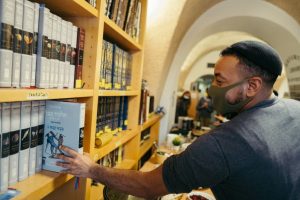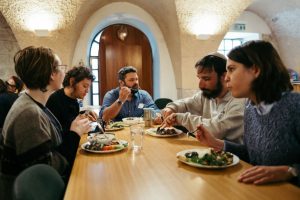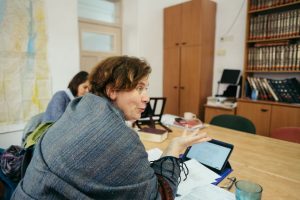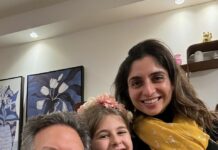
By Judith Sudilovsky
JERUSALEM — Walk the streets of Jerusalem on any given weekday morning, and you will discover there’s no shortage of intensive Torah study in this city that symbolizes the beating heart of the Jewish people.
Yet among the many yeshivas and seminaries it’s rare to find a beit midrash, or Jewish study hall, marked both by a commitment to egalitarian values and serious Torah study — not to mention one where Jews of color, LGBTQ+ Jews, converts, and Jews from marginalized groups are integral to the community.
The Conservative Yeshiva, which is part of the Fuchsberg Jerusalem Center, threads that unique needle: It is a place in central Jerusalem where leaders and seekers from all backgrounds come to deepen their Jewish scholarship and find their place in Jewish tradition.
“Students come here with a sense of intellectual integrity and honesty to engage with traditional texts,” said Liz M.K. Nelson, a former kollel student from the yeshiva originally from Detroit who is now the yeshiva’s recruiter. “They come here on their individual journeys, with their different approaches to Judaism, with a real sense of determination to pursue their individual spiritual goals in an intentional community.”
Even when it comes to Jewish texts that challenge their views and values, Nelson said, “Here they can grapple with them in a space where everyone is dedicated to working through them with a sense of commitment to tradition, community, and integrity.”
The Conservative Yeshiva offers a range of programs, from summer experiences to winter break learning programs to partnerships that can lead to a master’s degree in Jewish education or even the rabbinate.
But the flagships of the institution are its long-term learning programs.

Called Lishma — a Hebrew term that means doing or learning for its own sake — the program welcomes post-college students of any age. The Lishma program is currently accepting applicants for the fall; it is open to both full-time and part-time students.
Students from the Lishma and Advanced Halakhah programs eat with faculty at a weekly community lunch. (Jonny Finkel)
Orah Liss, a native of Frankfurt, Germany, who was raised in a Masorti home (the equivalent of Conservative Judaism outside of North America), came to Lishma after completing a Jewish studies program in Sweden focused on Jewish literature, history and philosophy. Liss, 26, was looking to learn more from and about traditional Jewish texts.
“I wanted to build the familiarity with it — not just the what, but the why. I wanted to read the Talmud and have an understanding of it,” Liss said. “For me the halacha is very important, as is the traditional prayer service, so I wanted a place with the traditional aspects along with egalitarianism.”
The generous spirit of the yeshiva community became evident when Liss was saying Kaddish for her grandmother, she said. Even on days when there were no scheduled prayer services, she said, “I asked for people to come for a minyan and on every day people showed up.”
Some students use the year at Lishma as a stepping-stone to rabbinical school. A new track called Omek (Hebrew for “depth”) offers specialization in areas that expands students’ Jewish literacy and breadth of spiritual knowledge on the pathway to becoming a rabbi at one of the seminaries with which the Yeshiva works — such as the Jewish Theological Seminary in New York and the Ziegler School of Rabbinic Studies in Los Angeles.
The focus isn’t just Jewish study, but also community building, immersion in authentic Jewish living and even innovation in worship.
Devorah Gillard, 66, a Lishma student from Nova Scotia, Canada, said she came to the Conservative Yeshiva at the Fuchsberg Jerusalem Center to learn Torah in an open environment.
“The Conservative Yeshiva encourages you to ask and explore and expand. You are not judged. They hear what you have to say — your doubts and fears —and they help you to grow,” she said.

Raised as an evangelical Christian, Gillard’s lifelong spiritual journey led her to convert to Judaism eight years ago. She’s now a board member of the Canadian Foundation for Masorti Judaism in Toronto. “I wanted to understand what it meant to be Jewish, to get to the depth of Torah,” Gillard said.
She said her fellow students have a zeal to engage with Judaism and do good in the world that’s infectious.
“These are people who are really serious about their religion and God and don’t just daven,” or pray, Gillard said. “They are more aware of the environment, food insecurity and inclusion. They go after what they want to do in this world.”
The Lishma program draws some 30 students a year to its Jerusalem campus from near and far. They study Talmud, Tanakh, and Midrash as well as Jewish philosophy and prayer in a way that seeks to accommodate modern scholarship and the contemporary world. Students come from all kinds of levels of Jewish knowledge and Hebrew proficiency; the Fuchsberg Jerusalem Center offers supporting programs to bring people up to speed as needed.
Allan Fis-Calderon spent most of his 20s advancing his career as a movie scriptwriter in Mexico City. But when the Covid-19 pandemic shut the world down, Fis-Calderon, 30, began to revisit his desire to study Torah. His rabbi from the city’s egalitarian Beit El Masorti synagogue suggested he look into the Conservative Yeshiva.
“So far this has been the best experience in my life — to experience Judaism from a liberal place where they take me into account. I feel at home and part of the group,” he said. “This has given me the opportunity to study Torah and develop myself as a Jew.”
Being in Israel at this crucial moment, where it feels like society is deeply divided, has made him appreciate Israel even more, Fis-Calderon said.
Much of the learning is conducted using the traditional Jewish method of chevruta, where students learn in pairs, but there is also plenty of classroom time with teachers.
Rabbi Joel Levy, the rosh yeshiva (yeshiva head), said his goal is to move every student along on their own journey of Jewish discovery.
“This is an immersive environment but not a coercive one. People need space and time to work out their relationship with Judaism and literacy,” Levy said. “Some people will come out of the other end saying they want to keep Shabbat and others will not keep Shabbat. I consider it a success when that decision has been made as an informed adult.”
Levy’s job, he said, is to create a space where people can take their own search seriously and openly.
The students who come to the Conservative Yeshiva hail from a range of Jewish denominations, races, ages, sexual orientations and gender identities. Though each may be in their own place in their individual religious journey, they learn and experience Jerusalem and Israel together as members of a Jewish community, he said.
“It is a total privilege to be with a group of people who are thinking about and searching for how to translate the wisdom and value of our tradition to today’s beautifully complex world,” Levy said.
This article was sponsored by and produced in partnership with the Fuchsberg Jerusalem Center, which offers egalitarian semester-long and summer programs in the heart of Jerusalem. This story was produced by JTA’s native content team.






